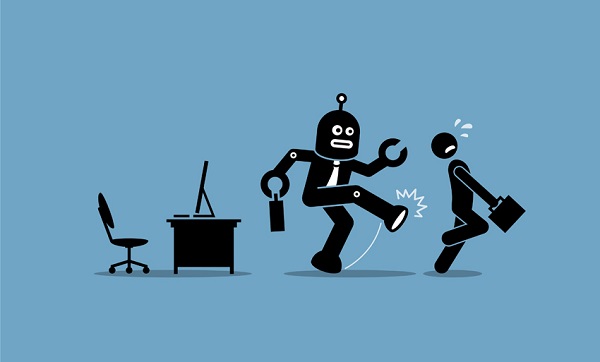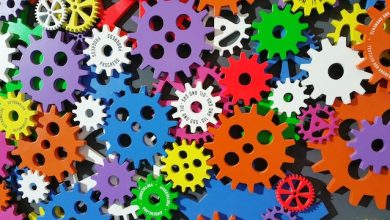8 Myths About AI in the Workplace

Artificial Intelligence (AI) can do a lot of things. It has the ability to multiply five-digit numbers almost instantly, it can modify eCommerce prices in real-time, and it can even control entire stock exchange markets. The application potential is close to infinite.
The global AI market is currently worth more than $22 billion, but it is projected to grow to a mind-boggling $126 billion by 2025. This can mean only one thing – AI is extremely powerful and it has a tremendous impact on modern businesses.
But it’s not almighty.
Way too many people mistakenly believe that AI (Artificial Intelligence) will completely change the way we do business. Although new technologies do make a big impact on everyday operations, they are not omnipotent. Our goal is to help you figure out the eight most common myths about AI in the workplace. Let’s take a look!
AI will fully displace employees
The most common AI-related myth is that advanced automation systems will totally displace employees and start doing 100% of their jobs. This is simply not the truth since AI cannot perform tasks commonly related to human employees. Even more, it doesn’t seem like AI will be able to do that anytime soon.
PwC predicts a relatively low displacement of jobs (around 3%) in the first wave of automation, but this could grow up to 30% by the mid-2030s.
Automation platforms are made with the purpose to replace repetitive and manual activities that rarely ever change. But when it comes to slightly more complex operations, AI is not as efficient as many people believe it to be.
Companies mostly use it to cut costs
Number two on our list is true, but not entirely. While AI definitely helps a lot of companies to cut costs and eliminate budget waste, this is not the main reason to deploy the technology.
On the contrary, 84% of businesses say AI will enable them to obtain or sustain a competitive advantage, while 75% of companies claim AI will allow them to move into new businesses and ventures. Budget optimization is also on the list of AI-induced business advantages, but it’s not nearly as important as the other two benefits we’ve just mentioned.
Automation eliminates more jobs than it creates
Another major concern among employees is that AI-powered automation will quickly eliminate a lot of jobs while failing to create the same number of new positions. This myth should not make you worried since 80% of business and tech leaders say AI actually boosts productivity and creates jobs.
But that’s not all as employees are also more than willing to adjust to the new reality. Lifelong learning has become the new norm and it will generate lots of alternative workplaces for individuals who end up losing jobs due to AI.
AI is not making an impact on my industry
On the other side of the spectrum, there are also optimists who claim that AI is not making any substantial impact on their industries. Although it may be possible in the case of creative niches, the fact is that many industries are not primarily based on creativity.
Take the paper service for instance. It is impossible to replace human essay writers with automated text generators, but editors and proofreading definitely can be replaced with advanced language processing platforms.
AI only boosts the productivity of companies, not employees
Way too many employees are afraid they will become obsolete because AI maximizes the productivity of their companies while minimizing the impact of the human workforce.
The first part of this myth is true because AI does increase a company’s productivity. But the latter part is false because AI actually allows employees to spend more time on creative tasks and idea generation, which leads to greater engagement and higher productivity.
AI, machine learning, and deep learning are the same concepts
As a relatively new field of IT and engineering, smart technologies create a lot of confusion in the workplace. This is how we get to the myth that AI is the same as machine learning and deep learning.
This is wrong because AI is the umbrella term that represents all devices capable of performing actions commonly associated with human beings.
Machine learning is a much smaller segment of AI that focuses on self-taught devices. On the other side, deep learning is even narrower as it focuses on self-initiated learning through unstructured data in an algorithm-free environment.
AI and robotics are the same things
This is another widespread misconception. AI and robotics overlap, but they are certainly not the same thing. We already explained that the goal of AI is to simulate human intelligence and make meaningful conclusions just like real human workers.
On the other hand, robotics mainly concentrates on physical devices built with the purpose to replace human labor. Robots can be used in many situations, but today they are particularly valuable in manufacturing processes and dangerous situations such as bomb deactivation.
AI-driven companies don’t care about human employees anymore
With everything we’ve stated so far, the last myth on our list barely requires an explanation. However, we still want to assure you that companies interested in deploying AI systems really do care about you and other human employees.
Every time a company gives you the chance to attend a seminar or take an online course to improve your skills, they prove they care for you and your long-term productivity. It often goes unnoticed by employees, but you should keep it in mind and rest assured that your employer really appreciates your contribution.
The Bottom Line
AI has changed the business landscape and forced almost every company to react by adopting cutting-edge software, tools, and apps. Advanced systems can do a lot of things better than a human being, but it doesn’t necessarily mean that AI poses a threat to human employees.
In this post, we did our best to debunk the eight most common myths about AI in the workplace. Do you agree with our statements or have something else to say about it? Is AI influencing your job in any way? Make sure to write a comment, so we can discuss this incredibly important topic together!




